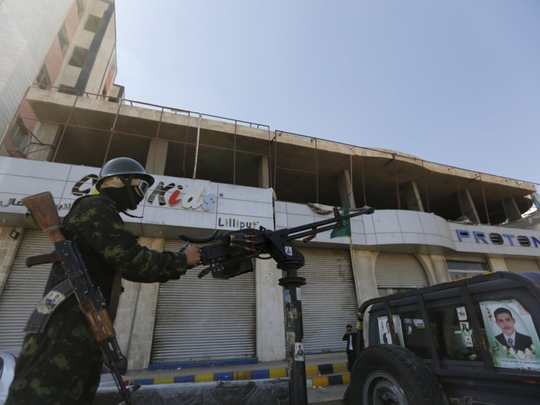
Al Mukalla: Iran-backed Al Houthi militants have agreed to allow Yemen’s legitimate government back to operate in the Yemeni capital Sana’a.
They have also agreed to hand over heavy arms to the state, Al Houthi spokesman Mohammad Abdul Salam told Kuwait’s daily Al Rai on Friday.
The comments come ahead of Monday’s talks in Kuwait that bring Yemen’s rival parties back to the negotiating table.
Abdul Salam said the militant group would also allow Yemen’s current vice president Ali Mohsen Al Ahmar, and influential oil and telecom tycoon, Hamad Al Ahmar, back into Sana’a.
The promised concessions by Al Houthis herald a major shift in their policy, analysts say.
“Our demand is consensual authority for a scheduled transitional period,” Abdul Salam said.
The transitional authority would decide on thorny issues like the number of regions for a new proposed federal state, disarmament of militant groups and secessionist demands in the south and grievances of Saada residents in the north.
In the interview, Abdul Salam denied widely held suspicions that the group was a pawn of Iran.
“We are not tools in the hands of anyone,” he said.
In an interview with Saudi media on April 13, Abdul Salam said rapprochement had been reached with Saudi Arabia and it was mulling releasing detainees including the defence minister and the son of Yemeni president Abd Rabbo Mansour Hadi.
The UN special envoy for Yemen who will be leading peace talks this week says peace has never been as close as it is today.
Esmail Ould Shaikh Ahmadtold the UN Security Council on Friday that he is hopeful despite “a worrying number of serious violations” of the cessation of hostilities that went into effect at midnight on April 10.
A concerted UN effort aimed at ending nearly 13 months of war in Yemen sees peace talks resuming Monday, but with a ceasefire barely holding.
Previous attempts have failed to stop the fighting which has killed thousands of people, forced almost 2.8 million from their homes and raised regional tensions.












